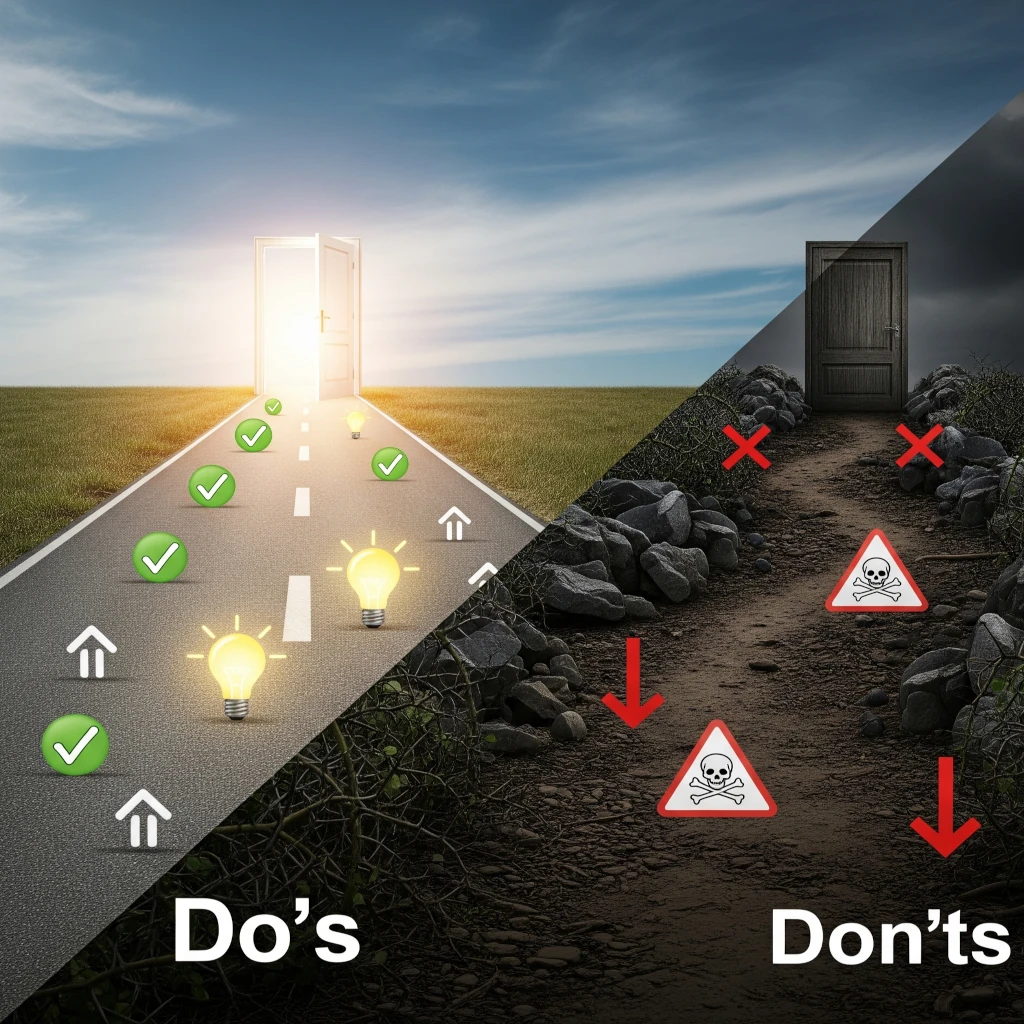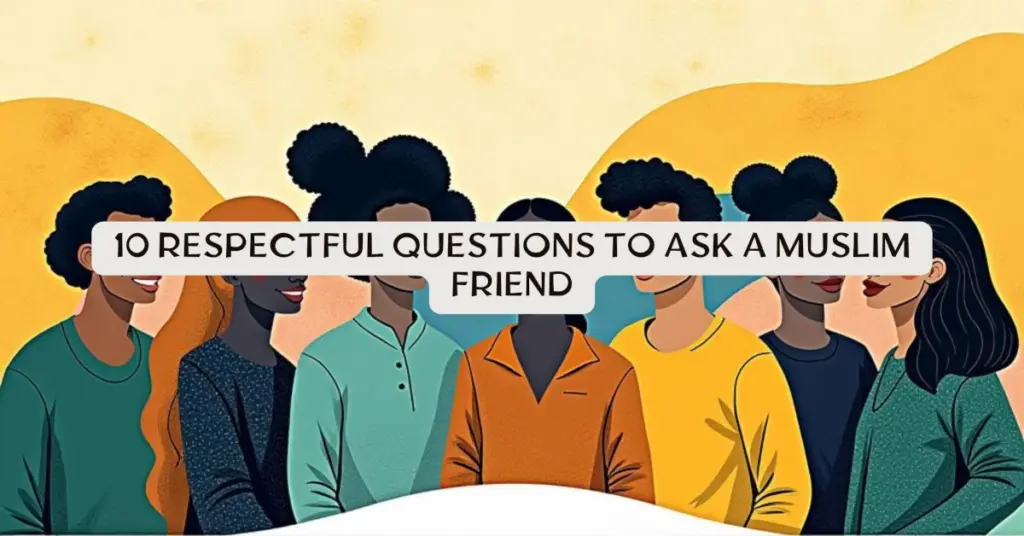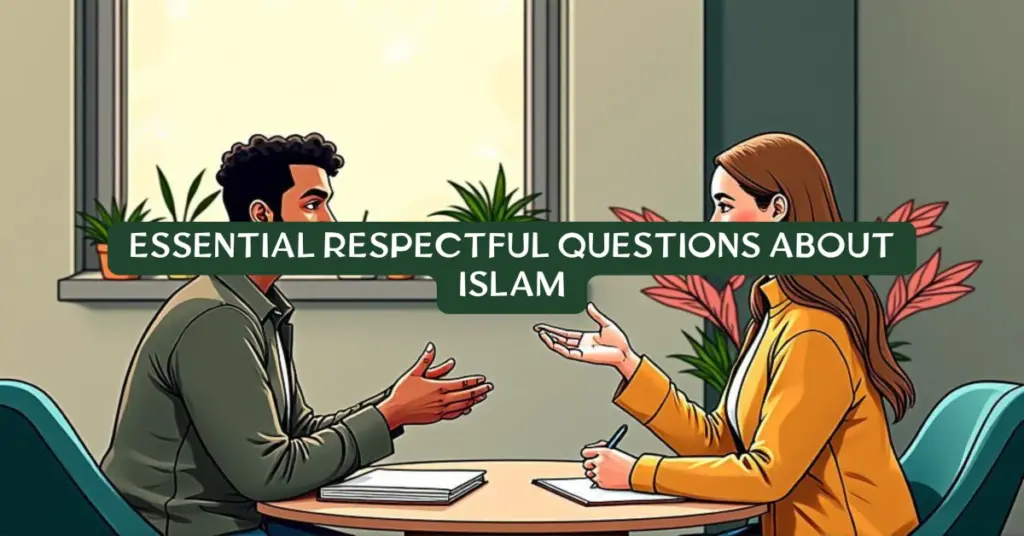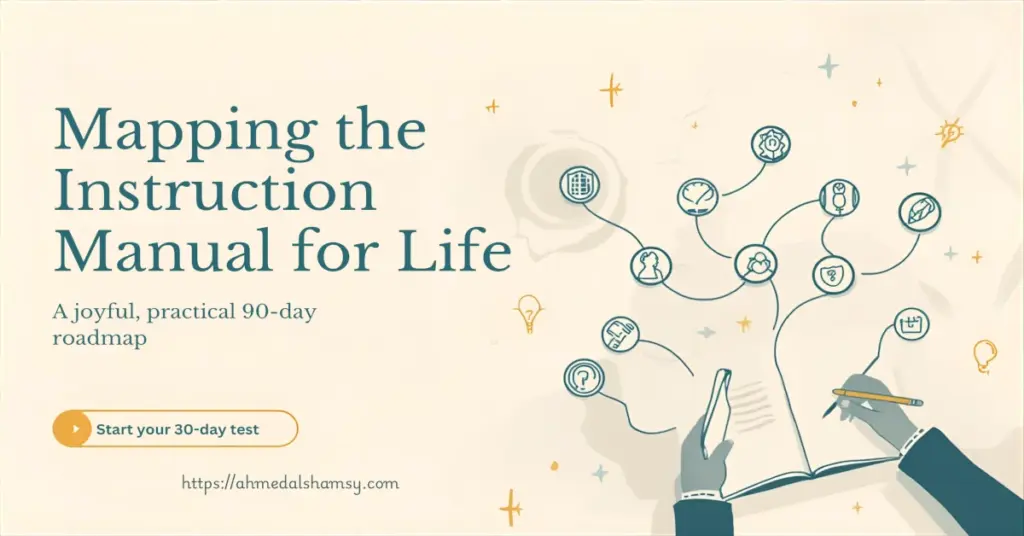AIM — Free & Open
CC BY-NC-SAAIM is free and open for non-commercial reuse. Try a free AIM pilot (CSV + memo) — support is optional and helps sustain translations, research, and free access.
Curious about Islam or a Muslim friend’s experience? Asking respectful, consent-based questions opens doors. This guide gives 10 carefully worded Respectful Questions to Ask a Muslim Friend, explains why each works, offers follow-ups and sample scripts, and includes practical facilitation tips — with numbered references for claims and advice. Use the questions to listen and learn, not to debate.
Table of Contents
Introduction – why respectful questions matter

Conversations about religion are often charged because they touch identity, history, and deep emotion. When questions come from genuine curiosity rather than confrontation, people tend to respond more openly and honestly. Learning someone’s personal story is usually far more illuminating than debating abstract doctrines or reacting to media stereotypes. The global Muslim population has grown in recent decades, increasing the importance of accurate understanding and respectful exchange across communities 1 . At the same time, practical guides for interfaith conversation and facilitation show that simple ground rules — asking permission, using open questions, and setting a tone of listening — measurably improve outcomes in sensitive discussions 2 3 4 .
Before asking anything, pause and check context: is this a private moment or a public setting? Have you built enough rapport? A quick opener such as “I’m curious and would like to learn — is it okay if I ask a few questions?” signals respect and gives the other person agency over the conversation. That consent step is one of the simplest but most powerful ways to avoid putting someone on the spot [2][3] .
How to use these questions — brief primer
These ten questions are intentionally open, personal, and non-confrontational. They prioritize lived experience over abstract theology, and they give the respondent control over how much to share. In a one-on-one setting, keep questions short and listen more than you speak. In a public or facilitated setting, follow basic rules: clarify the purpose, set ground rules, and use a neutral facilitator so that everyone can speak safely.
When collecting or asking sensitive questions in research or group settings, the literature on survey methods recommends neutral wording, explicit consent, and a clear option to decline — practices that reduce defensiveness and improve data quality 5 .
The 10 Respectful Questions to Ask a Muslim Friend – phrasing, why each works, and follow-ups

Respectful Questions to Ask a Muslim Friend, For each question I provide: why it helps, sample follow-ups, and a natural phrasing you can reuse.
1) “What does being Muslim mean to you personally?”
Why it works: This shifts conversation from stereotypes or textbook definitions to an individual’s lived identity. People typically respond with values, habits, or short stories — which reveal more than abstract arguments 6 .
Follow-ups: “How did you arrive at that?” / “Has that meaning changed over time?”
Sample phrasing: “If you don’t mind sharing, what does being Muslim mean to you personally?”
2) “Is there a story, verse, or teaching that shaped you?”
Why it works: Stories and specific teachings are memorable and reveal practical effects of belief in daily life. When people tell a story, they often reveal values, struggles, and turning points that convey more than theory [6].
Follow-ups: “Why did that stick with you?” / “Did it change a choice you made?”
Sample phrasing: “Is there a verse, hadith, or story from your faith that really shaped how you see things?”
3) “How do you usually practice your faith day-to-day?”
Why it works: This focuses on routines and practices rather than on external markers. Answers may include prayer, community service, family routines, or ethical habits — which help outsiders understand ordinary religious life.
Follow-ups: “Which part feels most meaningful?” / “Do you practice with family or community?”
Sample phrasing: “What does ‘practicing Islam’ look like for you during a normal week?”
4) “What common misconceptions about Islam do you wish people would stop repeating?”
Why it works: Giving someone the chance to name misconceptions empowers them to correct stereotypes and steer the conversation toward nuance. It’s also a constructive way to address misinformation without putting the person on the defensive [6].
Follow-ups: “Why do you think that misconception exists?” / “How could someone learn a better view?”
Sample phrasing: “From your experience, what are misconceptions people often repeat that aren’t true?”
5) “If I want to learn more, which books, podcasts, or articles would you recommend?”
Why it works: Asking for recommended resources demonstrates genuine intent to learn and gives the respondent control over what materials represent them. Resource-based learning is a practical step for anyone who wants informed, sustained understanding [6].
Follow-ups: “Any specific chapter or episode to start with?” / “Are there online teachers you trust?”
Sample phrasing: “Can you recommend one book or podcast that gives a good introduction from your perspective?”
6) “How do you handle disagreements about religion with family or friends?”
Why it works: This reveals conflict-resolution styles, cultural contexts, and relational norms. Understanding these dynamics helps outsiders appreciate how belief is negotiated in daily life.
Follow-ups: “Can you share an example that went well?” / “What do you wish people knew about those conversations?”
Sample phrasing: “How do conversations about religion usually happen with your family or friends?”
7) “What part of your faith brings you the most comfort during hard times?”
Why it works: This humanizes belief. People’s answers — whether prayer, community, trust in God, or rituals — give insight into spiritual resources that sustain them. Such personal details build empathy and connection.
Follow-ups: “Could you share a time it helped?” / “Was that comfort something you learned early or later?”
Sample phrasing: “When life is hard, what part of your faith do you lean on?”
8) “How do you see the difference between cultural practices and religious requirements?”
Why it works: Culture and religion are often conflated in public discourse; this question invites clarification and shows you respect local nuance. Answers help distinguish local customs from theological obligations, reducing stereotyping 7 .
Follow-ups: “Can you give an example from your community?” / “How would you suggest outsiders tell the difference?”
Sample phrasing: “In your experience, what parts of practice around you are cultural and which are religious?”
9) “Has your understanding of Islam changed since you were younger? If so, how?”
Why it works: This captures personal growth, generational differences, or intellectual development. People often appreciate the chance to explain their journey rather than be labeled by one moment in time.
Follow-ups: “What prompted that change?” / “Was there a pivotal event or a book?”
Sample phrasing: “Have your beliefs or practices changed since childhood? I’m curious how that happened.”
10) “What do you wish non-Muslims knew before making judgments?”
Why it works: This gives the person the last word — an opportunity to correct priorities and share what matters most to them. It’s an empathetic closing that invites the asker to reflect and possibly change behavior.
Follow-ups: “How could I start learning that?” / “What’s one small thing I could do differently tomorrow?”
Sample phrasing: “Before I form opinions, what would you want me to know or understand?”
Short conversation scripts – practical examples
Script A — casual coffee
You: “Hey — I’m curious about something. Is it okay if I ask you one question about Islam?”
Friend: “Sure.”
You: “Thanks. What does being Muslim mean to you personally?”
Friend: [shares]
You: “Thanks — that helps me understand.”
Script B — deeper, with vulnerability
You: “I noticed you mentioned prayer earlier. When life is hard, what part of your faith do you lean on?”
Friend: [shares a verse or practice]
You: “That’s powerful. If you don’t mind, could you tell me the verse or recommend where I can read more?”
Friend: [recommends a resource]
You: “I’ll check that out — thank you.”
Respectful Questions to Ask a Muslim Friend, These short scripts show permission-seeking, simple questions, and gratitude – basic moves that keep conversation respectful and meaningful [2][3].
Do’s & Don’ts – quick reference

Respectful Questions to Ask a Muslim Friend, Do
- Ask consent first. A brief invitation decreases defensiveness and signals respect.
- Use open questions and listen actively. Paraphrase to confirm you understood.
- Accept “I’d rather not answer” without pressing.
- Ask for resources rather than rely on media soundbites.
Respectful Questions to Ask a Muslim Friend, Don’t
- Treat one person as a spokesperson for all Muslims.
- Conflate culture or nationality with religion.
- Open with highly charged terms or political accusations unless they invite that topic.
- Interrupt to correct — wait and ask a clarifying question if needed.
Respectful Questions to Ask a Muslim Friend, These rules reflect standard facilitation and interfaith practice: consent, respectful tone, and neutral phrasing consistently produce safer conversations and better learning outcomes [2][3][4].
Handling tense or emotional moments
If someone becomes upset or the topic turns to injustice or trauma, follow these steps:
- Acknowledge emotion: “I hear that brought up strong feelings — thank you for sharing.”
- Pause the content: Offer to switch topics if they want.
- Ask how to be helpful: “Would you like advice, a listener, or resources?”
- Avoid debating theology in emotional moments: Return to intellectual questions later if both parties want that.
- If public/facilitated: implement a short break and offer a private follow-up for those who need it.
Respectful Questions to Ask a Muslim Friend, These steps mirror best practices used by interfaith facilitators and community mediators to keep conversations safe and productive [2][3][4].
Practical tips for public or facilitated conversations
When organizing a group conversation, set clear ground rules (speaking time, no interruptions, confidentiality, and consent for recording). Use a neutral moderator and invite participants to set community norms at the start. Provide resource lists and a debrief at the end. Evidence from facilitation guides and university discussion tips shows that structure leads to clearer, less defensive dialogue and better retention of learning [2][3][4].
Respectful Questions to Ask a Muslim Friend, If you plan to collect data or run a study about attitudes, follow standard survey guidelines for sensitive questions: use neutral wording, give explicit skip options, and explain how responses will be used [5].
How to continue learning (recommended next steps)
- Read one recommended book or listen to a suggested podcast by people your friend actually recommends — that shows respect for their perspective and gives you reliable, grounded information [6].
- Attend an interfaith event or panel run by reputable organizations with clear facilitation norms; that structured environment often yields deeper understanding [2][4].
- Follow a diverse set of voices on social platforms — scholars, community leaders, and practitioners — so you hear multiple lived perspectives rather than a single narrative [6].
- Practice the questions in low-stakes conversations first, and gradually use them in deeper ones as trust grows.
FAQs
Are these questions okay to ask a stranger?
Start with lighter questions and always ask permission. Strangers may prefer shorter exchanges or resource recommendations rather than personal stories.
What if my friend becomes defensive?
Pause, validate their feelings, and offer to change topics. You can follow up later with an apology if needed.
Can these questions be used in public forums?
Yes, but public settings need stricter ground rules and facilitation to protect participants’ safety and dignity [2][3].
References
- Pew Research Center — Global religious demography and Muslim population change (2010–2020). Reports and analyses showing growth patterns and the global diversity of Muslim communities, used here to explain why learning about Muslim experience has growing global relevance. ↩︎
- Interfaith America — Shared Values Facilitation Guide and practical pointers for interfaith dialogue. Practical guidelines for consent, ground rules, and facilitation that informed the “how to use” and facilitation advice. ↩︎
- University of Nebraska–Lincoln — “Ten Tips for Facilitating Discussions on Sensitive Topics.” A concise set of facilitation best practices (clarify purpose, set ground rules, paraphrase, reflect) referenced for handling sensitive or public conversations. ↩︎
- Interfaith UK — “Let’s Talk: Practical Pointers for Interfaith Dialogue.” A community-facing PDF guide with do’s and don’ts and practical suggestions for safe, respectful interfaith exchange. ↩︎
- CINT and survey-methods literature on asking sensitive questions: articles and guidance on neutral wording, consent, skip logic, and reducing defensiveness in survey and interview contexts. These informed the short section on phrasing and consent for sensitive topics. ↩︎
- Community and media sources used for phrasing inspiration: selected editorials, community Q&A (forums) and educational pieces that provide realistic question wording and examples for respectful conversation. These were used to shape sample phrasing and scripts. ↩︎
- VisualCapitalist and related population reference material: summaries and charts showing where largest Muslim populations are located globally, used to support discussion on cultural variation and why one person’s answers reflect local culture as much as religion. ↩︎
Discover more from Ahmed Alshamsy
Subscribe to get the latest posts sent to your email.







